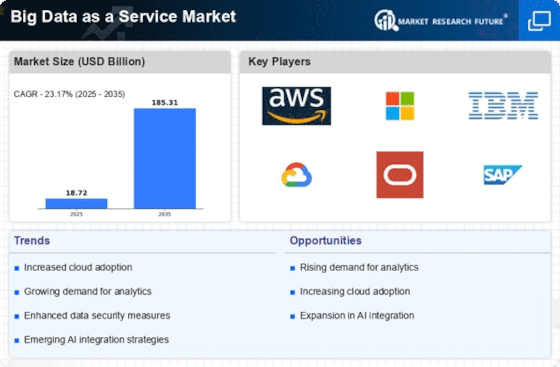Market Trends
Key Emerging Trends in the Big Data as a Service Market
The Big Data as a Service (BDaaS) market is experiencing significant trends and transformations, reflecting the ever-evolving landscape of data management and analytics. As businesses across various industries recognize the importance of harnessing large volumes of data for insights, the demand for BDaaS solutions continues to grow. One notable trend is the increasing adoption of cloud-based BDaaS platforms. Organizations are shifting away from traditional on-premises solutions to leverage the scalability, flexibility, and cost-effectiveness offered by cloud services. This migration allows companies to streamline their data processing and storage, enabling more efficient and agile operations.
Moreover, the integration of artificial intelligence (AI) and machine learning (ML) capabilities within BDaaS solutions is gaining prominence. Businesses are seeking advanced analytics tools to extract meaningful insights from their data, and AI and ML play a pivotal role in this process. These technologies enable predictive analytics, anomaly detection, and automated decision-making, empowering organizations to make data-driven decisions with greater accuracy and speed. As a result, BDaaS providers are enhancing their offerings with AI and ML functionalities to meet the evolving needs of their clients.
Another key aspect shaping the BDaaS market is the focus on data security and privacy. With the increasing volume and sensitivity of data being handled, organizations are prioritizing robust security measures to safeguard against potential breaches and unauthorized access. BDaaS providers are responding to this concern by implementing advanced encryption, access controls, and compliance features to ensure that their platforms adhere to stringent data protection regulations. This emphasis on security is crucial for building trust among businesses and fostering broader adoption of BDaaS solutions.
Furthermore, the democratization of data analytics is emerging as a prominent trend in the BDaaS market. Traditionally, data analytics expertise was concentrated within dedicated teams, limiting the accessibility of insights to a select few. However, BDaaS platforms are now designed to be user-friendly, allowing individuals across various departments to access and analyze data without requiring extensive technical skills. This democratization empowers organizations to foster a data-driven culture, where decision-makers at all levels can contribute to and benefit from data insights, fostering innovation and agility.
The ongoing global digitization and the proliferation of Internet of Things (IoT) devices are also contributing to the growth of the BDaaS market. The vast amounts of data generated by IoT devices present both opportunities and challenges for organizations. BDaaS platforms offer the infrastructure and capabilities to handle and derive value from this influx of data, enabling businesses to harness insights from diverse sources, including sensors, devices, and other connected assets. This convergence of big data and IoT is reshaping industries such as healthcare, manufacturing, and logistics, where real-time data analytics is crucial for optimizing processes and decision-making.


















Leave a Comment